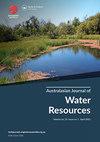Methods for regional calibration - a case study using the TopNet hydrological model for the Bay of Plenty region, New Zealand
IF 2.2
Q2 WATER RESOURCES
引用次数: 2
Abstract
ABSTRACT The regional parameters can be derived from physiographic factors such as topography, soil type, and vegetation. In this study the suitability of five regional parameterisation methods was investigated and assessed to provide guidance on how to select optimal parameter sets. The overarching goal was to improve the accuracy of a hydrological model when applied at the regional scale. The regional parameterisation techniques assessed were: 1) averaging of optimal parameter sets of gauged catchments, 2) calibrating several catchments with a regional performance efficiency, 3) weighted average performance criterion for calibration, 4) largest number of positive Nash-Sutcliffe coefficients and 5) a Bayesian parameter selection method. The parameterisation methods were assessed by applying TopNet in sixteen gauged catchments in the Bay of Plenty region on the North Island of New Zealand, to then predict flows for five test catchments. It was shown that any of the five regionalisation methods considered improved flow predictions of Mean Annual Low Flow when compared to applying the same model with a prescribed spatially distributed set of the key model parameter. The improvement was less pronounced for mean flow and high flow, regardless of the method used and was linked to the hydrogeology class of the catchments.区域校准方法——新西兰丰盛湾地区TopNet水文模型的案例研究
区域参数可以从地形、土壤类型和植被等地理因素中获得。在本研究中,研究和评估了五种区域参数化方法的适用性,为如何选择最佳参数集提供指导。总体目标是提高在区域尺度上应用水文模型的准确性。评估的区域参数化技术包括:1)测量流域最优参数集的平均,2)用区域性能效率校准多个流域,3)加权平均性能标准的校准,4)最大数量的正Nash-Sutcliffe系数和5)贝叶斯参数选择方法。参数化方法通过在新西兰北岛丰盛湾地区的16个计量集水区应用TopNet进行评估,然后预测五个测试集水区的流量。结果表明,与使用相同的模型和指定的空间分布的关键模型参数集相比,五种区划方法中的任何一种都考虑了年平均低流量的改进流量预测。无论使用何种方法,平均流量和高流量的改善都不太明显,这与集水区的水文地质类别有关。
本文章由计算机程序翻译,如有差异,请以英文原文为准。
求助全文
约1分钟内获得全文
求助全文
来源期刊

Australasian Journal of Water Resources
WATER RESOURCES-
CiteScore
5.10
自引率
21.90%
发文量
25
期刊介绍:
The Australasian Journal of Water Resources ( AJWR) is a multi-disciplinary regional journal dedicated to scholarship, professional practice and discussion on water resources planning, management and policy. Its primary geographic focus is on Australia, New Zealand and the Pacific Islands. Papers from outside this region will also be welcomed if they contribute to an understanding of water resources issues in the region. Such contributions could be due to innovations applicable to the Australasian water community, or where clear linkages between studies in other parts of the world are linked to important issues or water planning, management, development and policy challenges in Australasia. These could include papers on global issues where Australasian impacts are clearly identified.
 求助内容:
求助内容: 应助结果提醒方式:
应助结果提醒方式:


